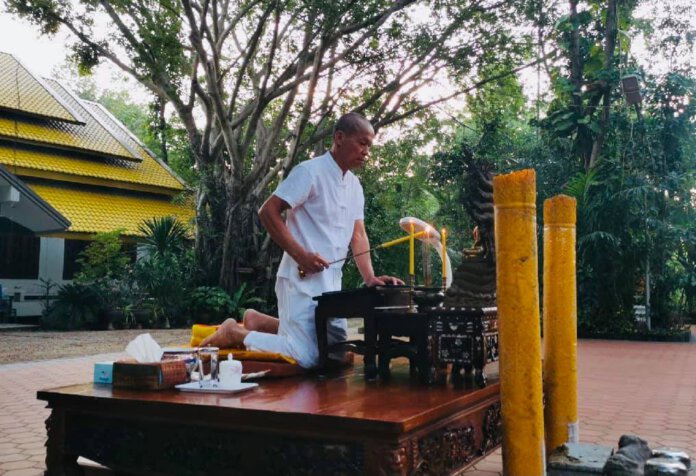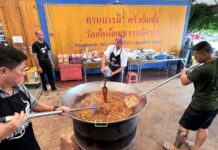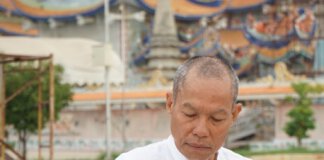มีผู้ตั้งประเด็นถามเรื่อง ทำไมสังคมไทยถึงได้เน้นพิธีกรรม
อธิบายให้เข้าใจก่อนเบื้องต้นว่า สังคมไหนบนโลกใบนี้ จะเป็นชาวตะวันตกอย่างพวกฝรั่ง หรือชาวตะวันออกอย่างพวกเรา ตั้งแต่เกิดยันตาย ทุกชนเผ่าบนโลกนี้ล้วนมีพิธีกรรมกันทั้งนั้น
ไม่ว่าจะเป็นพิธีกรรมศีลจุ่มของศาสนจักร หรือพิธีกรรมแสวงบุญของพี่น้องชาวมุสลิม พิธีกรรมไหว้บรรพบุรุษของพี่น้องศาสนาเต๋าและขงจื๊อ และลัทธิชินโตของญี่ปุ่นก็ยังมีพิธีกรรมแต่งงานที่ไม่เหมือนลัทธิความเชื่ออื่น
ส่วนคนไทยที่หลากหลายไปด้วยพิธีกรรมนั้น เป็นเพราะพื้นเพของสังคมไทยตั้งแต่สมัยอดีต ก็มีลัทธิบูชาภูติมาเป็นทุนเดิม
ต่อมามีการสื่อสารเดินทางไปมาหาสู่แลกเปลี่ยนสินค้าของพวกต่างบ้านต่างเมือง ต่างชาติ ต่างภาษา พวกเขาได้นำพาเอาลัทธิความเชื่อของตนเข้ามาเผยแพร่ จนเป็นที่ยอมรับของบรรพบุรุษไทย
และในลัทธิความเชื่อนั้น ก็มีทั้งพราหมณ์และฮินดู พุทธ เต๋า ขงจื๊อ อิสลาม คริสต์ แต่ไม่ว่าจะยอมรับลัทธิความเชื่อศาสนาใด คนไทยก็ยังไม่ละทิ้งความเชื่อเก่า คือ ลัทธิบูชาภูติ และไสยศาสตร์ มนต์ดำ ด้วยเพราะพวกเขาเชื่อว่า แผ่นดินนี้ได้มาและอยู่มาได้จนถึงทุกวันนี้ ก็เพราะลัทธิทั้งสอง
ต่อมาแม้จะรับเอาศาสนาพุทธ ศาสนาอิสลาม ศาสนาคริสต์ และศาสนาอื่นมาแล้วก็ตาม คนไทยก็ยังไม่ทิ้งประเพณี วัฒนธรรม ความเชื่อเก่าๆ ที่พวกเขายึดถือมาด้วย เพราะเป็นปัจจัยหลักในยุคก่อร่างสร้างบ้านแปลงเมือง
ส่วนพิธีกรรมของพุทธศาสนานั้น เริ่มมาตั้งแต่องค์พระบรมศาสดาทรงตรัสรู้อนุตตรสัมมาสัมโพธิญาณ และทรงประกาศพระสัทธรรม ก็เริ่มมีพิธีอาราธนาศีลอาราธนาธรรม
และเมื่อทรงรับบุคคลเข้ามาเป็นสาวก ก็ทรงมีพิธีรับเข้าหมู่ เรียกว่า พิธีขอบวช ด้วยพิธีเอหิภิกขุอุปสัมปทา
ต่อมาเมื่อมีคนเข้ามาขอบวชมากขึ้น พระพุทธองค์จึงทรงมอบให้ภิกษุสาวกเป็นผู้รับผู้มาขอบวชเอง เรียกพิธีนั้นว่า ติสรณคมนูปสัมปทา คือการปลงผม โกนหนวด แล้วกล่าวปฏิญาณ
เป็นผู้ถือพระรัตนตรัยเป็นสรณะ เป็นที่พึ่ง พร้อมรับฟังคำสั่งสอนเบื้องต้น คือ ข้อที่ควรทำ เรียกว่า ข้ออนุญาต ข้อที่ไม่ควรทำเรียกว่า ข้อห้าม รวมบทกำหนดทั้งสองเรียกว่า “ศีล”
และเมื่อมีผู้ศรัทธา ปราถนาที่จะเข้ามาบวชกันมากขึ้น และเพื่อให้หมู่สงฆ์มีส่วนร่วมคัดกรองผู้ที่จะเข้ามาบวชด้วย
พระพุทธองค์จึงทรงยกเลิกพิธีให้บุคคลบวชพระสองอย่างแรกนั้นเสีย ให้เหลือเอาไว้แค่พิธีบวช หรือบรรพชาสามเณรเท่านั้น
ส่วนผู้ที่จะเข้ามาขอบวชพระ จะต้องให้หมู่สงฆ์เห็นชอบด้วย พิธีนั้นเรียกว่า ญัตติจตุตถกรรมวาจา คือ กรรมอันมีวาระครบสี่ และมีคำประกาศยกบุคคลให้เป็นภิกษุต่อหน้าหมู่สงฆ์ ๔ ครั้ง
เหล่านี้คือพิธีกรรมหลักๆ ของพุทธศาสนา ซึ่งก็ยังมีพิธีกรรมรองๆ ลงมาในกิจกรรมต่างๆ ที่เกิดขึ้นในพุทธจักร แต่ไม่ว่าจะเป็นพิธีกรรมหลัก หรือพิธีกรรมรอง ล้วนแต่มีเอาไว้เพื่อเป้าหมาย เพื่อความ
๑. ฝึกปรือความเป็นระเบียบเรียบร้อยและ ให้เป็นอันเดียวกันทั้งศาสนจักร
๒. เพื่อคัดกรองบุคคลที่จะเข้ามาสู่ศาสนจักร
๓. เพื่อฝึกปรือบุคคลให้หมั่นศึกษา สั่งสม อบรม เรียนรู้ ปฏิบัติ
๔. เพื่อพัฒนาผู้ที่เข้ามาในศาสนา ให้เป็นผู้เจริญจนถึงขีดสุด
นี่แหละคือเป้าหมายของพิธีกรรมในพุทธศาสนา
พุทธะอิสระ
————————————————–
A story from Clubhouse
April 10, 2021
Someone raised a question why Thai society focuses on rituals.
First, please understand in the first place that any society in this world whether Westerners or Easterners like us, from birth till death, all ethnic groups in this world have rituals.
Whether it is baptism of Christianity, or Muslim pilgrimage, or Taoism and Confucianism’s ancestor veneration, or Japanese Shinto’s wedding ceremony which is different from others.
Thai way of life is full of various rituals because Thai society in the past originally had spiritualism.
Later, when there were communication, transportation, and trading with foreign countries, foreigners brought in and disseminate their own beliefs which were accepted by Thai ancestors.
Those accepted doctrines and beliefs consist of Brahmanism, Hinduism, Buddhism, Taoism, Confucianism, Islam, and Christianity. Despite accepting any doctrinal and religious beliefs, Thais have not abandoned their original beliefs in spiritualism, superstition and black magic because Thais believe that this land can exist till today because of these two doctrines.
Later, after accepting Buddhism, Islam, Christianity, and other religions, Thais have not abandoned old traditions, cultures, and beliefs because they were major factors in the era of country establishment.
As for Buddhist ceremonies, after Lord Buddha’s enlightenment and his announcing of Dhamma teaching, originated ceremonies to request for percepts and sermons.
When Lord Buddha accepted people to be his disciples, then originated the ordination ceremony in which monks were individually ordained by Lord Buddha himself.
Later, when there were more people wishing to be ordained, Lord Buddha assigned monks to conduct ordination ceremony. The ceremony consists of hair removal, shaving, and ordination oath. An ordained person was supposed to adhere to the Triple Gems, be ready to accept the first teachings regarding code of conduct and prohibition called precepts.
When there were more faithful people wishing to join monkhood, in order that clergy took part in screening people, Lord Buddha abolished the first two ordination ceremonies, leaving only the novice ordination ceremony.
For those who wish to enter monkhood, they must be accepted by the clergy. The ceremony is clergy’s major collaborative activity and there are four times announcements of accepting a person to be monk in front of the clergy.
These are major Buddhist ceremonies. There are also other minor ceremonies within Buddhist activities. Whether major or minor rituals, they all have following objectives :
1. To foster discipline and unity within diocese
2. To screen people who wish to enter monkhood
3. To train people to persevere to study, accumulate knowledge, learn, and practice Dhamma
4. To develop Buddhist personnel till they attain ultimate enlightenment
These are goals of Buddhist rituals.
Buddha Isara







